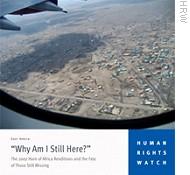VOA标准英语10月-Rights Group Calls for Release of Rendition Suspe(在线收听)
In late 2006, Ethiopian troops launched a military operation to ousted the Islamic Courts Union from control of Mogadishu, the capital of Somalia. The ensuing fighting caused thousands of people to flee west across the border into Kenya, joining the already sizable community of refugees that had fled earlier rounds of violence in Somalia.
 |
| Human Rights Watch's “Why Am I Still Here?” rendition report |
According to a new report by Human Rights Watch, more than 150 of these people, citizens of 18 different countries and including women and children, were detained by Kenyan authorities. At least 90 were then taken back into Somalia, where they were handed over to Ethiopian troops and moved again, to Addis Ababa.
The report is based on testimony from current and former detainees. Many say they were tortured and confined to cramped cells. They were denied access to lawyers and human rights groups, and were not allowed to contact their families.
Human Rights Watch says many of the detainees were interrogated by U.S. officials from the Central Intelligence Agency and the Federal Bureau of Investigation, and many were released only after their interviews with American officials were completed.
Jennifer Daskal is a Senior Counsel for terrorism issues at Human Rights Watch, and an author of the report.
"We know that there were American agents in Ethiopia who interviewed several detainees after they had been rendered," she said. "Presumably they had some knowledge about what happened to these men women and children. And the United States is certainly complicit in the fact that its agents were interrogating individuals who were without a doubt being held incommunicado and in many cases also being physically abused."
Human Rights Watch says nine Kenyans and one Canadian remain in Ethiopian custody and more than 20 East Africans are unaccounted for. The remaining detainees have communicated with rights groups, and have been visited by Kenyan officials, but despite pledges to repatriate them they remain in Ethiopia.
The renditions have long been an issue of concern to Muslims and rights groups in the region.
"These renditions are extremely high profile, particularly in Kenya, where there are a number of local groups who are working to pressure the Kenyan national government to do something to get the Kenyan citizens who are still detained in Ethiopia home," Daskal said. "And there is a widespread belief, whether it is true or not that Washington supported and backed these renditions. And it contributes to the anti-American sentiment that is growing and pretty palpable in the region."
Officials in Kenya, Ethiopia, and the United States have said in the past that the detainees were legitimate terror suspects and have denied taking any illegal actions. Kenyan officials were not immediately available for comment on Wednesday, a public holiday.
The release of the report comes on the day that the American military's new Africa Command, or AFRICOM, officially launches on the continent. AFRICOM has been billed as an interagency program with a focus on soft power, including humanitarian projects and training, as well as a way to streamline military operations on the continent.
But many in the region are concerned about a growing American military presence on the continent, particularly one that appears overly focused on issues of terrorism. Nowhere is this impression stronger than in the Horn of Africa, where the United States has been pursuing terrorism suspects in lawless Somalia.
The U.S. military has fired several air strikes at terrorism suspects inside Somalia. In May, one such strike killed Aden Hashi Ayro, a leader of the radical Islamist Shabab militia, which has ties to al Qaida. But other strikes have been less successful, and analysts say civilian casualties have stirred anti-American sentiment in Somalia.